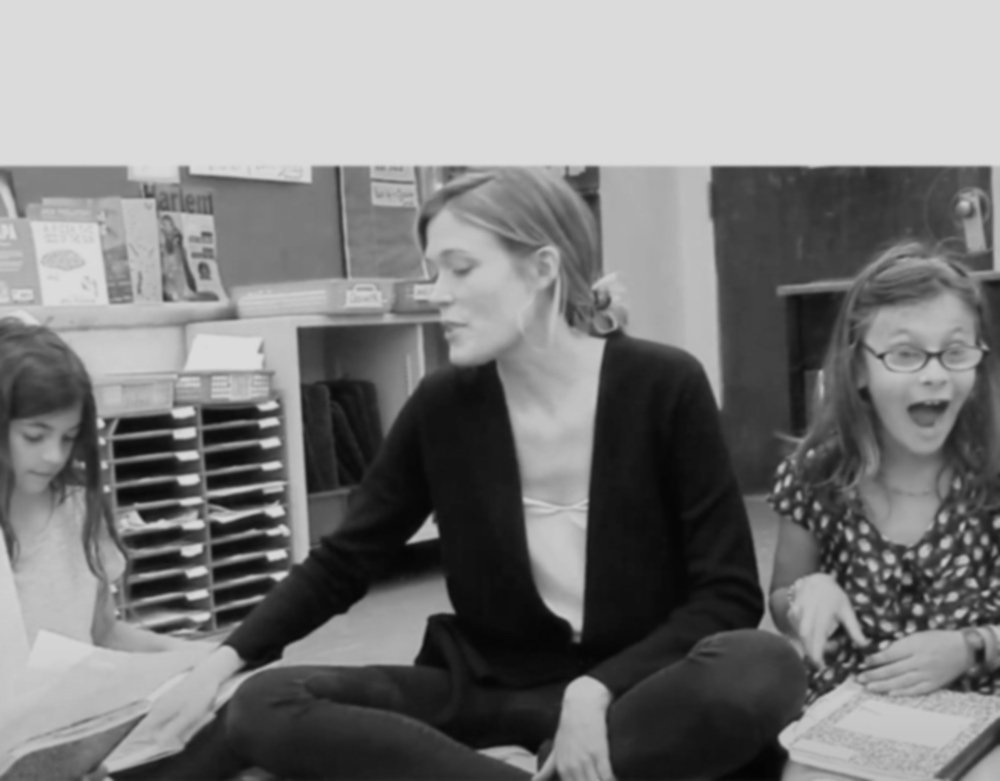
Professional Development with Lily
Lily is available for keynotes, single-session workshops, full-year coaching, and more. She works alongside Preschool through Grade 8 administrators and teachers to design professional development that is inspiring and practical: Lily believes that the best PD offers not only an invitation for a shift in mindset, but also the tangible resources to make that shift a reality. When Lily supports educators, she comes prepared with custom-created materials (such as differentiated templates, mentor texts, and writing invitations) so teachers and students can try out new ideas immediately.
Below, you’ll find a list of Lily’s most popular workshops and coaching topics.
Cultivating Connection Throughout the First Eight Weeks of School
Establishing and maintaining a connected classroom community isn’t a nice-to-have, it’s a need-to-have; a prerequisite for meaningful learning. Connectedness—defined by Dr. Brené Brown as the energy that exists between people when they feel heard, seen, and valued—lifts students out of feeling unwelcome or dysregulated and into a place where they are ready to learn: “Being connected is the most efficient and effective way to get information up to the cortex”(Perry & Winfrey, 2021). This workshop introduces simple creative-writing and visual-art invitations, games, and peer-to-peer feedback routines that open the door to connection, which in turn opens the door to every other good thing that happens at school: joy, engagement, inspiration, you name it.
Brain-Changing Words: Shared Classroom Language That Transforms How Kids Think, Feel, and Achieve
Words aren’t just tools for communicating with others, they’re also tools for regulating and positively navigating our interior worlds. This truth carries profound implications for the way in which teachers talk to kids, especially in the context of a youth mental health crisis. This workshop offers language suggestions that can trigger a tectonic shift in how kids perceive themselves and navigate challenges—in the classroom, at home, and beyond.
Positive Classroom Management
How can educators effectively respond to challenging behavior while also maintaining children’s dignity? How can students learn to see their hardest moments not as “who they are” but simply as instances in which something was difficult for them? This workshop empowers educators to move away from incentivizing kids to simply modify their behavior (think sticker charts and demerits) and instead towards identifying the root of children's challenging behavior. Only then can teachers offer specific coaching, strategies, and tools that enable students to do better next time.
The Power of Student Agency: How Choice Boosts Engagement & Investment in Learning
Educators can inspire a love of learning that transcends the classroom by weaving opportunities for student agency throughout all areas of curricula. When teachers move away from a compliance-oriented, one-size-fits-all approach to instruction and instead let students’ interests and strengths lead the way, engagement soars. This workshop introduces practical strategies and resources (such as choice boards, enrichment extensions, and varied publishing options) that inspire children to listen to their instincts and take ownership in their learning.
Teaching Emotional Literacy Through Reading and Writing Instruction
Emotional literacy—the ability to name, express, and manage our feelings—is a skill often neglected in the traditional teaching model, yet one that’s essential to success in the classroom and beyond. Emotionally literate kids can navigate their anxieties, diplomatically advocate for themselves, and tackle challenges with a growth mindset. This workshop outlines how teachers can weave a focus on emotional literacy into reading and writing curricula through personal narrative brainstorming strategies, book club discussion prompts, and reading responses.
Windows & Mirrors: Fostering an Inclusive Classroom Community
In Emily Style’s 1988 essay “Curriculum as Window and Mirror,” she explains that in order to feel valued and welcome at school, students need “mirrors”: positive reflections of their identities and experiences. But to cultivate an appreciation of varied perspectives and lived realities, students also need “windows”: insights into identities and experiences different from their own. This workshop introduces strategies to ensure that all children feel represented and validated at school, as well exercises that invite kids to imagine and respect the perspectives of others.
Creative Drama in the Classroom: Making Literacy Learning Come Alive
This workshop outlines how to weave Creative Drama strategies (such as narrative pantomime and guided imagery) into reading and writing curricula. These kinesthetic techniques get kids up from their desks and inspire them to engage with their literacy learning with energy and joy.
Where Poems Hide: Weaving Poetry into All Subject Areas
Are your students reticent writers? Poetry—with its economy of language and endless possibilities—is a breath of fresh air for children. Writing poetry connected to social studies, mathematics, science, and, of course, literacy curricula can inspire students to find delight in unexpected places, to make meaningful connections with each other and with academic content, and to express their learning in varied ways.
Student-as-Teacher: Enriching Learning Through Peer-to-Peer Instruction
We’ve all heard it said: “The best way to learn something is to teach it.” But what exactly does this look like in the classroom? Educators can boost children’s engagement at school and their understanding of academic material by providing opportunities for peer-to-peer teaching moments.
Customize Your Experience
Lily understands that every educational environment is unique. Contact Lily to inquire about customization options, availability, and pricing. Together, you can create a professional development plan that addresses your specific hopes and areas for growth.
